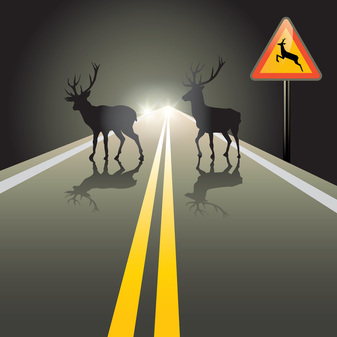AVOIDING DEER COLLISIONS
Picture this: you’re driving along a winding country road enjoying the beautiful fall foliage and all-of-a-sudden a huge buck runs in front of your vehicle. How would you react? Fall is peak time for deer-vehicle collisions thanks to deer mating season which begins in fall and runs through January. During this time deer are very active and on the move. According to the National Highway Traffic Safety Administration (NHTSA), large animal-vehicle collisions result in an average of 187 fatalities annually.
Back to the question — how would you react? Not sure? Here are some helpful tips on how to avoid a collision:
1. Say “no” to swerving — Never EVER swerve. Swerving is especially dangerous because it puts the driver at risk for a head-on collision with oncoming traffic, trees or even a ditch and confuses the deer as to where to go.
2. SLOW down — Slow down if you’re driving through an area with high deer populations. If you drive defensively, you’ll have more time to break if you cross paths with a deer.
3. Leader of the pack — Deer rarely travel alone so if you see one it’s likely another is close behind.
4. Put your foot on the brake — If you cross paths with a deer, brake firmly while staying in your lane and blow your horn to frighten the deer away.
5. Green eyes — At night watch for the shine of eyes along the side of the road (their eyes usually look green).
6. Sun up, sun down — deer are most active at dusk and dawn.
7. Center lane — the center lane on a multi-lane road is the “safest” place to drive because it gives deer space and drivers additional time to react.
8. Faulty-products — There are many products on the market that claim to shield off deer (like whistles and repellent) unfortunately, these products are not proven to work.
Remember deer collisions can happen to the best of drivers. If you strike a deer never touch the animal. Pull over to the side of the road as soon as you safely can, call police immediately and report the damage to your insurance agent as soon as possible.
Picture this: you’re driving along a winding country road enjoying the beautiful fall foliage and all-of-a-sudden a huge buck runs in front of your vehicle. How would you react? Fall is peak time for deer-vehicle collisions thanks to deer mating season which begins in fall and runs through January. During this time deer are very active and on the move. According to the National Highway Traffic Safety Administration (NHTSA), large animal-vehicle collisions result in an average of 187 fatalities annually.
Back to the question — how would you react? Not sure? Here are some helpful tips on how to avoid a collision:
1. Say “no” to swerving — Never EVER swerve. Swerving is especially dangerous because it puts the driver at risk for a head-on collision with oncoming traffic, trees or even a ditch and confuses the deer as to where to go.
2. SLOW down — Slow down if you’re driving through an area with high deer populations. If you drive defensively, you’ll have more time to break if you cross paths with a deer.
3. Leader of the pack — Deer rarely travel alone so if you see one it’s likely another is close behind.
4. Put your foot on the brake — If you cross paths with a deer, brake firmly while staying in your lane and blow your horn to frighten the deer away.
5. Green eyes — At night watch for the shine of eyes along the side of the road (their eyes usually look green).
6. Sun up, sun down — deer are most active at dusk and dawn.
7. Center lane — the center lane on a multi-lane road is the “safest” place to drive because it gives deer space and drivers additional time to react.
8. Faulty-products — There are many products on the market that claim to shield off deer (like whistles and repellent) unfortunately, these products are not proven to work.
Remember deer collisions can happen to the best of drivers. If you strike a deer never touch the animal. Pull over to the side of the road as soon as you safely can, call police immediately and report the damage to your insurance agent as soon as possible.


 RSS Feed
RSS Feed
